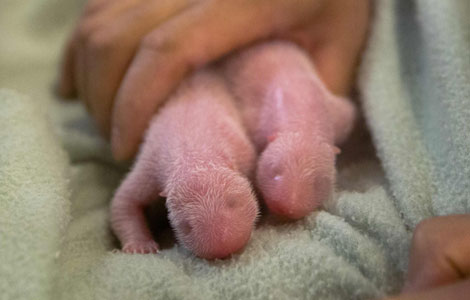Abe: No dealing on Diaoyu Islands
Updated: 2013-07-18 08:20
By Zhang Yunbi in Beijing and Cai Hong in Tokyo (China Daily)
|
||||||||
Japan's PM stands firm on dispute before upper house elections
Japanese Prime Minister Shinzo Abe pledged to make no concessions on the territorial dispute with China during a rare visit to two remote southwestern islands on Wednesday.
Observers said the Japanese leader feels the Diaoyu Islands topic is "indispensable" to the success of Sunday's upper house election as well as the Cabinet's maritime ambitions.
The two islands, Ishigaki and Miyako, are located in Japan's Okinawa prefecture. Ishigaki is only 160 km away from China's Diaoyu Islands in the East China Sea.
Abe said "provocations are continuing" and "the maritime security situation is worsening" in reference to the regular patrols of Chinese government vessels in the waters off the Diaoyu Islands, Japan's Jiji News Agency reported.
"We will not consider even one step back," (on the Diaoyu Islands standoff), he said when addressing the public in Ishigaki city.
In response, Beijing urged Tokyo to "stop provocative remarks and actions" that infringe on China's sovereignty and to contribute more toward a diplomatic settlement.
"The Chinese government will continue taking necessary measures to firmly safeguard the territorial sovereignty of the Diaoyu Islands," Foreign Ministry spokeswoman Hua Chunying said.
Li Xiushi, a Japanese studies researcher at the Shanghai Institutes for International Studies, said some voices within Japan are justifying the necessity for a military buildup and confrontation with China because they believe Tokyo is "faced with disadvantages" in the territorial standoff.
"But they have ignored that it was Japan who took the initiative to increase the tension regarding the islands," Li said of Tokyo's unilateral announcement of "nationalizing" the islands in September 2012.
Jiji News Agency reported that Abe was the first serving prime minister to visit Ishigaki and Miyako since the United States "returned" Okinawa to Japan in 1972.
The short distance from the Diaoyu Islands allows Japanese right-wing activists to board ships on Ishigaki and embark on trips to the waters off the Diaoyu Islands.
One of the latest confrontations happened on June 30, when about 30 Japanese set off from Ishigaki to the Diaoyu Islands but were expelled by China Marine Surveillance vessels.
On Wednesday, Abe also visited the bases of Japan's coast guard and self-defense forces on the two islands, asking them to defend Japan's air and maritime territories.
Yang Bojiang, a Japanese studies expert at the Chinese Academy of Social Sciences, said the Japanese government has increasingly emphasized maritime security of late.
"The surrounding sea was expected to protect Japan in the past, but these days, Tokyo believes the country should in turn protect the sea," Yang said of Japan's latest paradigm shift in maritime strategy.
As for Abe, it is rare for a prime minister to visit Ishigaki, and "it is a strong message for China", Japan's Asahi Television said.
In its latest defense white paper, released on July 9, the Japanese Defense Ministry again underscored China as a major threat to maritime security.
The annual report for the first time elaborated on detailed contingency plans for "safeguarding or retaking remote islands".
Zachary Keck, assistant editor of The Diplomat, also warned in a recent article that Tokyo still has an interest in strengthening its armed forces.
"A potential future Chinese threat is unlikely to sway the public to accede to defense budget increases in the same way that a current territorial dispute tinged with historical significance and nationalistic fervor can," Keck said.
Abe started his election campaign in Okinawa on Tuesday to canvas for candidates of his Liberal Democratic Party, which is leading Japan's opinion polls ahead of Sunday's upper house election.
He said Japan is facing a serious security situation because of the Democratic People's Republic of Korea's rocket launch and China's military buildup.
Contact the writers at zhangyunbi@chinadaily.com
Zhang Fan contributed to this story.
(China Daily USA 07/18/2013 page8)
Most Viewed
Editor's Picks

|

|

|

|

|

|
Today's Top News
GSK finance head not allowed to leave
Putin puts US ties above Snowden
DPRK demands Panama free seized ship
7.75% growth possible for 2013: IMF
Bomber as rock star?
More use smartphones to access the Internet
Mandela making dramatic progress: daughter
Manila playing for 'sympathy'
US Weekly

|

|














